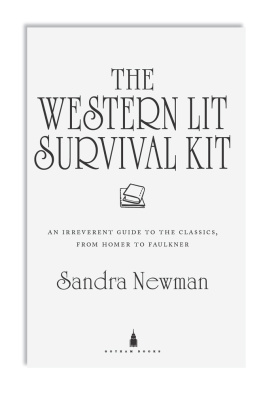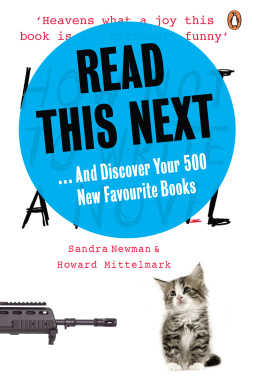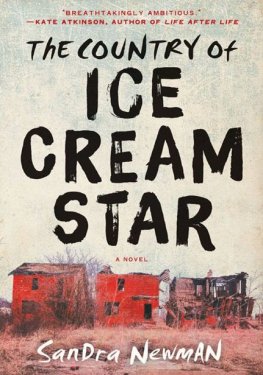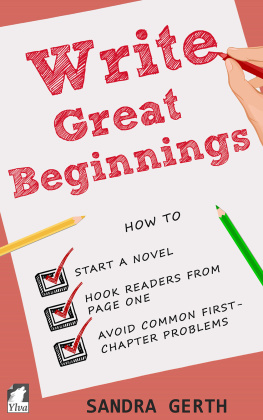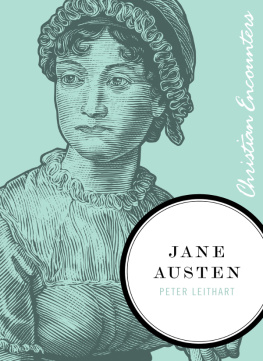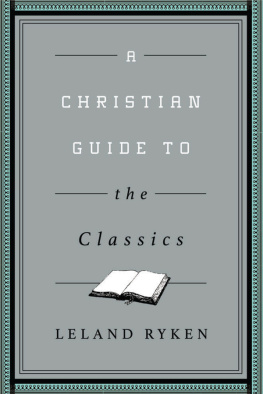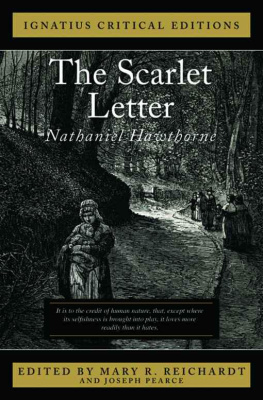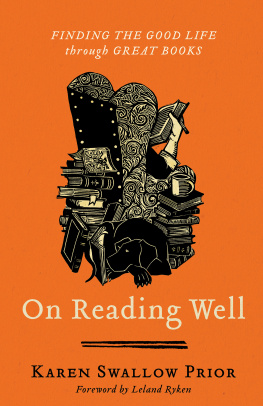THE
WESTERN LIT
SURVIVAL KIT

THE
WESTERN LIT
SURVIVAL KIT

AN IRREVERENT GUIDE TO THE CLASSICS,
FROM HOMER TO FAULKNER
Sandra Newman

G O T H A M B O O K S
GOTHAM BOOKS
Published by Penguin Group (USA) Inc.
375 Hudson Street, New York, New York 10014, U.S.A.
Penguin Group (Canada), 90 Eglinton Avenue East, Suite 700, Toronto, Ontario M4P 2Y3, Canada (a division of Pearson Penguin Canada Inc.) Penguin Books Ltd, 80 Strand, London WC2R 0RL, England. Penguin Ireland, 25 St Stephens Green, Dublin 2, Ireland (a division of Penguin Books Ltd) Penguin Group (Australia), 250 Camberwell Road, Camberwell, Victoria 3124, Australia (a division of Pearson Australia Group Pty Ltd) Penguin Books India Pvt Ltd, 11 Community Centre, Panchsheel Park, New Delhi110 017, IndiaPenguin Group (NZ), 67 Apollo Drive, Rosedale, Auckland 0632, New Zealand (a division of Pearson New Zealand Ltd) Penguin Books (South Africa) (Pty) Ltd, 24 Sturdee Avenue, Rosebank, Johannesburg 2196, South Africa
Penguin Books Ltd, Registered Offices: 80 Strand, London WC2R 0RL, England
Published by Gotham Books, a member of Penguin Group (USA) Inc.
First printing, January 2012
1 3 5 7 9 10 8 6 4 2
Copyright 2012 by Sandra Newman
All rights reserved
Gotham Books and the skyscraper logo are trademarks of Penguin Group (USA) Inc.
LIBRARY OF CONGRESS CATALOGING-IN-PUBLICATION DATA
Newman, Sandra, 1965
The western lit survival kit : an irreverent guide to the classics, from Homer to Faulkner /
Sandra Newman.
p. cm.
EISBN: 9781101554081
1. Best books. 2. Literature. 3. Criticism. I. Title.
Z1035.9.N55 2012
011.73dc23 2011032730
Printed in the United States of America
Set in Adobe Caslon Pro
Designed by Elke Sigal
Without limiting the rights under copyright reserved above, no part of this publication may be reproduced, stored in or introduced into a retrieval system, or transmitted, in any form, or by any means (electronic, mechanical, photocopying, recording, or otherwise), without the prior written permission of both the copyright owner and the above publisher of this book.
The scanning, uploading, and distribution of this book via the Internet or via any other means without the permission of the publisher is illegal and punishable by law. Please purchase only authorized electronic editions, and do not participate in or encourage electronic piracy of copyrighted materials. Your support of the authors rights is appreciated.
While the author has made every effort to provide accurate telephone numbers and Internet addresses at the time of publication, neither the publisher nor the author assumes any responsibility for errors, or for changes that occur after publication. Further, the publisher does not have any control over and does not assume any responsibility for author or third-party websites or their content.

Acknowledgments
This book might never have been written were it not for my sometime writing partner/sometime roommate Howard Mittelmark, who suggested the project and helped shape it from the start. I am grateful for his comments and contributions throughout, particularly in the medieval and American sections. Nonetheless, all errors remain mine. (Except one! If you think you know which error is Howards, send in your answer. If you win, youll receive a limited edition, leather-bound collection of all of our very best errors.)

Introduction
I n the 1920s, educators like Mortimer Adler started the Great Books programs, while imprints like Everymans Library made the classics available to everyone at reasonable prices. It was an ambitious crusade to bring literature to the people, and was phenomenally successful in achieving one thing. From then on, not just English majors, but everybody else could feel guilty about not reading the Great Books. Meanwhile, universal education gave young people the opportunity to associate literature with suffering as early as high school. By the time they reached college, they already knew that Sister Carrie was impenetrable, turgid, and boring, and that whatever language Shakespeare spoke, it wasnt English. Tainted by association, literature had all the appeal of Bible studies.
Recently, publishers have turned to spoon-feeding (Ulysses for DummiesExtra-Dumb Edition); fear (1001 Books to Read or Youll Die!!!!); and quirk (How Proust Can Change Alain de Bottons Income) with some success. Even people who dont want to read the Great Books will read about the Great Books. In fact, reading about the Great Books is now a votive act, like buying a gym membership although you never go, or separating your recyclables before jumping in the SUV.
Theres just one thing wrong with this. Literature is a pleasure. It should be emotionally satisfying, intellectually thrilling, and just plain fun. And if it isnt, you shouldnt feel bad about not reading it.
This book treats Western lit like an amusement park. It offers a guide to the rides, suggesting which ones are fun for all ages, which are impossibly dull for all ages, and which might take a lot out of you but offer an experience you simply cant get anywhere else.
For readers who have already ingested a generous sampling from the Great Books, this book will offer a unifying perspective, fresh insights, and cheap jokes at the expense of your favorite and least favorite authors. For the reader approaching Western literature for the first time (or for the second time, having been badly burned in school), this book will help you judge which authors are really worth attempting.
Each individual work is assigned ratings from one to ten in the areas of Importance, Accessibility, and Fun. I have tried to make these as objective as possible. This means that they are subjective assessments of what the average reader will feel. Of course, you may be a person who ripped through Joyce effortlessly, or who thought The Scarlet Letter was a laugh riot. Please do not be upset if you stumble over anomalies. Instead, sit back and congratulate yourself: dude, you are no average reader.
A note: Fun does not mean Quality. Paradise Lost is a work of acknowledged genius. It is also about as much fun as being trapped in a freezer. In the Fun rating, Ive tried to incorporate various possible sources of fun, such as the loveliness of poetry and the page-turning quality of fiction. However, it all boils down to assessing the entertainment value of a worknot the deathless masterpieceness.
For the purposes of this book, Western literature is what you traditionally learn about when you go to college to study literature. This book will not redress imbalances or redefine the canon. It will concentrate on works considered important in the English-speaking world, passing by Bchner and Mickiewicz and every single Albanian who ever lived without a second glance. Or a first glance.
Among other matters, the present author, like almost everyone else, would be happier if Western literature were not quite as white and male as it is. Like almost everyone else, however, there is nothing I can do about it, except try not to let it bother me, and drink. Cest la vie, which as everyone knows, is not a bowl of cherries. And if it were, in past centuries, white men would have eaten all of them, while the rest of us would have had to wash the bowl. Still, when they were full of all that healthy cherry energy, those white guys wrote some pretty good books.

